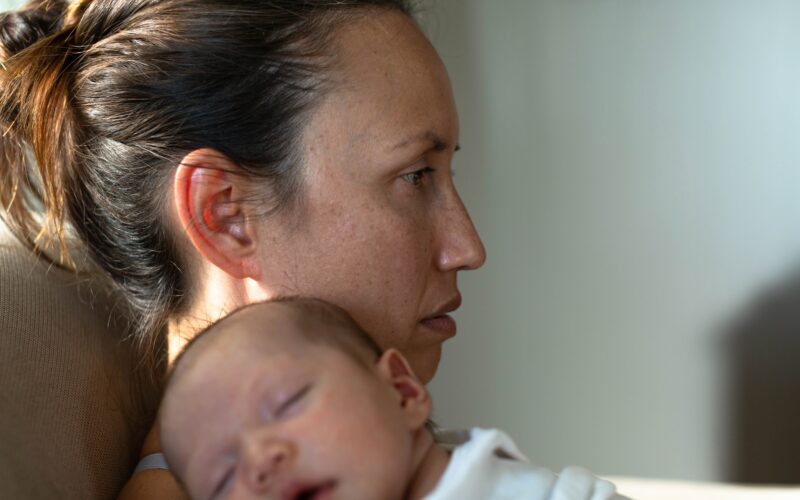Bringing a new life into the world is a transformative and profound experience for moms. At the same time, the postpartum period poses unique challenges as new mothers navigate significant physical and emotional changes while caring for their newborns–all with little sleep. One such challenge is postpartum depression (PPD), and women who have previously suffered depression caused by their hormonal birth control may be at higher risk.
What causes PPD?
The cause of PPD cannot be attributed to a single factor. Genetics, physical changes, and emotional issues may all play a role. As researchers and medical professionals continue to gain an understanding of factors that influence postpartum mental health, a growing amount of research has focused on the potential link between depression following the use of hormonal birth control (HBC) and PPD.
PPD may impact as many as 1 in 8 American women who have recently given birth, according to the Centers for Disease Control and Prevention (CDC). Because of PPD’s prevalence, and because it is a serious condition that requires prompt medical attention and treatment, better understanding PPD, its warning signs, and its risk factors is of vital importance for the health and safety of moms and babies everywhere. And because hormonal birth control (HBC) use is so prevalent in American society, and given its known associations with the development of depression, understanding the possible connection between depression following HBC use and PPD is crucial. A 2023 research study published in JAMA Psychiatry has shed new light on the nature of this connection [1].
How do researchers find out whether postpartum depression is connected to depression following hormonal birth control use?
Researchers wanted to know whether women who experienced depression due to their HBC use were at higher risk of later developing PPD compared to women whose history of depression was unrelated to HBC use. Researchers analyzed Danish health registry data collected on 188,648 first-time mothers from 1995 through 2017. PPD was presumed in women who filled a prescription for antidepressant medication or who received a hospital discharge diagnosis of depression within 6 months after first childbirth as recorded in the National Prescription Register or National Patient Register [3][4].
Sometimes what (or who) wasn’t studied is just as important as what (or who) was. Who wasn’t included in the study? The researchers excluded women who:
- had never used HBC (because the purpose of the study was to evaluate sensitivity to hormonal agents)
- “immigrated at 16 years or older or emigrated for more than 6 consecutive months after turning 16;
- had a depressive episode before 1996 or within 12 months prior to delivery, as this could indicate an ongoing depression while entering pregnancy; and
- had a multiple birth or stillbirth” [1].
In the study, women who previously experienced depression with their HBC were at higher risk of experiencing PPD compared to women who had a history of depression related to other factors. But how much is the risk increase? Out of all the 188,648 participants, 3% had a history of HBC-associated depression, 9.8% had a history of depression not associated with HBC use, and 87.2% had no history of depression at all. 1.3% of all the women developed PPD.
Women with a history of HBC-associated depression were 35% more likely to experience PPD than women with a history of non-HBC-associated depression.
Women with a history of HBC-associated depression were 35% more likely to experience PPD than women with a history of non-HBC-associated depression. Women with no prior depression were 75% less likely to develop PPD than women with previous non-HBC-associated depression. The study reported that 5.2% of women with previous HBC-associated depression and 3.7% of women with previous non-HBC-associated depression developed PPD. Women with previous HBC-associated depression were almost 1.5 times more likely to develop PPD compared to women with previous non-HBC-associated depression.
Interestingly, 1.3% (the total proportion of all the women studied who developed PPD) is a much lower incidence of PPD than in the general population. The research study itself stated that about 13% of all postpartum mothers develop PPD. The researchers didn’t speculate on the reason for the discrepancy, but it could be due to the exclusion criteria outlined above. Also, PPD rates have risen over time, and the researchers studied women who gave birth in 1996 (when PPD rates were lower) through 2017 (when rates had become much higher).
How does this compare to what we already know?
These results are in line with findings from a very small study published in 2000 that mimicked the massive hormone withdrawal of childbirth (by administering high doses and then stopping them) and studied its effects on women with and without a history of PPD [2]. Most of the women in that study with a history of PPD developed depressive symptoms. But none of the women without a history of PPD did. While the small sample size limits the generalizability of this older research, it does support the idea that some women are more sensitive than others to the effects of sex hormones like estrogen and progesterone. These women may be more susceptible to suffering depression, including PPD, from the synthetic sex hormones in HBC. This highlights the importance of managing fertility in both men and women without interfering with the body’s natural functions in order to reduce the risk of long-term health problems.
The insights gained from both the recent 2023 study and the older 2000 study align with existing knowledge surrounding HBC and mental health. Depression and poor mental health have been linked to hormonal birth control time and time again. In her book “How the Pill Changes Everything: Your Brain on Birth Control“, Dr. Sarah E. Hill explores how HBC can influence a woman’s moods, perceptions, and stress responses due to changes in hormone balance and ultimately, brain chemistry. Dr. Hill postulates that some women may experience depressive episodes triggered by fluctuations in estrogen levels due to combined (i.e., estrogen and progestin-containing) forms of birth control.
Does this mean that hormonal birth control use is connected to postpartum depression risk?
As is typical of research suggesting negative consequences of hormonal birth control use, the researchers from the 2023 study insisted that HBC itself isn’t necessarily to blame. They wrote:
“Importantly, the findings do not imply that HC use leads to a higher risk of PPD but do indicate that a history of HC-associated depression may unmask PPD susceptibility, which may prove useful as a clinical tool in PPD risk stratification” [1].
In other words, HBC may cause or trigger the original depression diagnosis in some women. And these same women, who seem more vulnerable to mental health consequences of large hormonal shifts such as those that occur postpartum, may be more likely to develop PPD down the road.
Does ‘hormonal sensitivity’ explain why some women who take birth control may be at higher risk of future postpartum depression?
In an interview with Cosmopolitan magazine, Dr. Deborah Lee said the 2023 JAMA Psychiatry study “adds weight to the belief that some women are hormone sensitive and are more susceptible to mood disorders such as depression after taking hormonal contraception.”
She then discussed how this sensitivity can affect women particularly around the time of pregnancy:
“Pregnancy is a time of major hormonal changes – at the end of pregnancy, estrogen levels are very high, but after childbirth, they drop precipitously. This steep fall in estrogen may cause postpartum depression.”
Still, what we don’t know is if these women were already more vulnerable to depression in the first place (i.e., before beginning HBC), or if the HBC actually sensitized or made them vulnerable to depression. We do know that women who start HBC in their teen years have a higher likelihood of ever experiencing a future depression diagnosis compared to women who start HBC as adults. This suggests that when HBC is started matters, especially when it comes to developing teen brains. Further research into the connection between hormonal birth control-induced depression and later diagnosis of postpartum depression is therefore crucial.
A holistic approach to postpartum mental health
We know that PPD may be influenced by a number of variables: family history of depression, complications with past pregnancies or childbirth, support system availability, and lifestyle choices like hormonal birth control use. One thing is particularly clear, however: HBC use is a modifiable risk factor. Instead of using HBC for family planning–whether before pregnancy or after–women and couples have the option of using natural family planning (NFP) or fertility awareness methods (FAMs) for both family planning and health monitoring. These natural methods allow women to track their cycles using biological markers that correlate with fertile and infertile times of the woman’s cycle. The information women can gain from tracking their cycles gives them the power to manage their fertility without increasing their risk of PPD. Our postpartum mental health guidebook provides further information on how to support women during the fourth trimester.
References:
[1] Larsen SV, Mikkelsen AP, Lidegaard Ø, Frokjaer VG. Depression Associated With Hormonal Contraceptive Use as a Risk Indicator for Postpartum Depression. JAMA Psychiatry. 2023;80(7):682–689. doi:10.1001/jamapsychiatry.2023.0807 [2] Bloch, M., Schmidt, P., Danaceau, M., Murphy, J., Nieman, L., & Rubinow, D. (2000, June 1). Psychiatry Online. The American Journal of Psychiatry. https://ajp.psychiatryonline.org/doi/full/10.1176/appi.ajp.157.6.924 [3] Wallach Kildemoes, H., Toft Sørensen, H., & Hallas, J. (2011). The Danish National Prescription Registry. Scandinavian Journal of Public Health, 39(7_suppl), 38–41. https://doi.org/10.1177/1403494810394717 [4] Lynge, E., Sandegaard, J. L., & Rebolj, M. (2011). The Danish national patient register. Scandinavian Journal of Public Health, 39(7_suppl), 30–33. https://doi.org/10.1177/1403494811401482 [5] X. Liu, K.L. Musliner, E. Agerbo, K.G. Ingstrup, Y. Sun, Y. Yu, T. Munk-OlsenTreatment indications for antidepressants prescribed to pregnant women: a population-based descriptive study from Denmark
Pharmacoepidemiol. Drug Saf., 29 (2020), pp. 347-351, 10.1002/pds.4953
Additional Reading:
“When does postpartum depression start” and other questions, answered: A Natural Womanhood PPD FAQ
How I overcame postpartum depression with bioidentical progesterone
Understanding and recognizing postpartum depression
The fourth trimester guidebook: Your postpartum mental health matters







